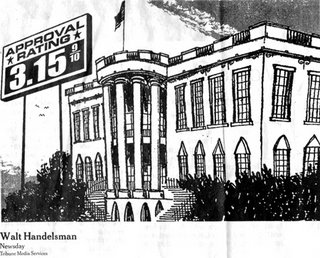

When I worked in politics, there were still some heroes. I wanted to work in their campaigns and get them elected because I believed in them and thought it was the right thing to do. Campaigns and campaigning were exhilarating. The hours were long and the talk was loud and fervent. There were still institutions to trust. There was humor, debate and fun.
People were heckled but not shouted down. There was debate but the debaters weren't attacked or harrassed. There were critical comments and satiric humor but very little censorship or categorical, judgemental rebuttals. Nothing like today's if you aren't with us you're not a patriot! And there was respect for politicians and their staff -- they didn't have terrible favorability ratings as Bush and Congress have today.
All of that - the heroes, the desire to
 work to elect a person you really liked and trusted, the debates and depth of conversations, the campaigning - these all made it alive, vibrant and fun. The only remnant of the fun from those days are today's political cartoons. They hit their target and make you think, yet they also make you smile.
work to elect a person you really liked and trusted, the debates and depth of conversations, the campaigning - these all made it alive, vibrant and fun. The only remnant of the fun from those days are today's political cartoons. They hit their target and make you think, yet they also make you smile. I don't think that many of you will disagree that politics isn't fun anymore. But why is that?
One of my original political heroes, a real live WWII hero and Hawaii's first Congressman and a US Senator since 1962, Daniel Inouye, once told a group of political consultants his opinions on the subject:

When a series of Campaign Finance Laws came into effect in the early '80s, it required serious financial disclosure. Federal candidates even had to make their tax returns public. Prior to that time it was voluntary. Many wealthy people that had the right motives to get into politics (they had already made their money, they knew how to give and take to get things done, and they thought they had the skills and desire to give back in the political arena) were reluctant to expose how they came to earn their money.
A few results from that time in history:
1. Up until then, the number of laws passed by Congress had been going up and was close to 15,000 a year; subsequently the number has gone steadily down. It was below 5,000 when I was last able to get an accurate figure.
2. From that time forward, the makeup of Congress has changed; from wealthy businessmen with a few lawyers to mostly lawyers with many fewer business executives, and very few super rich people.
3. Because the makeup has changed, so too has the willingness to compromise. Righteousness in Congress is a new reality when before it was dealmaking to make things happen that was prevalent. The resulting squabbling between legislators is a big turnoff to the public and results in fewer compromises and even fewer laws.
4. Because Congress of old was more wealthy, access and influence were less important than real information. Trips to the district, lobbyists and non-profit organizations all provided the feedback and specifics needed to vote on an issue. Today, access and influence are big business and information and the public are suffering.
Isn't this what happens when the righteous have power? A deterioration of trust in the system followed by a spiraling cynacism toward authority followed by a decline in lawfullness? Isn't this what happens when Atlas Shrugged (from Ayn Rand's book of the same title)?
Let's have some fun and throw out the bums and elect a new set and then see what happens. Join the action and vote.